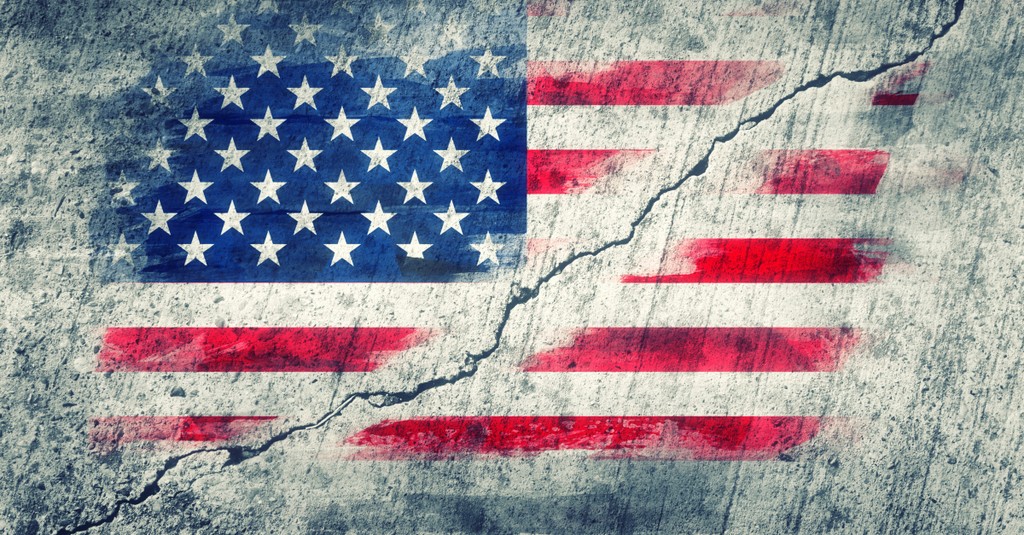
The screaming jolted us. My son and I were at the gas station, when were startled by a couple a few pumps over yelling at one another. When I say “yelling” you need to know that this was a full-on shouting match between both parts. And somehow there was a poor dog involved too. It looked as if it could get violent, but I wasn’t sure which one was going to take the first swing. It was deeply unsettling.
What was my responsibility here? I don’t know either of these people. I have no relationship with either of them. My son is present, so I know my interference in the conflict must be somewhat limited because my highest duty is protecting him. But I found myself feeling a bit like Pam in “The Office” when she found herself trapped between her co-workers. “This cannot be my job”.
Do you ever feel like this within our nation? People are squabbling all around us—and maybe we even get involved ourselves—and before we know it, relationships are harmed, and people are begging us to take a side. What is the church’s role in a divided nation?
Photo Credit: ©Getty Images/natasaadzic

1. To Stay United Ourselves
Jesus’ first disciples were divided politically. Well, at least a couple of them were. Simon (not Peter) was a Zealot. That meant he was committed to resisting Roman rule. He’d have abhorred sell-outs, like tax collectors. Matthew was a tax collector; in Simon’s mind, he was a collaborator of Rome and a traitor to both God and Israel.
When they both began following Jesus, their identities were transformed. Their primary allegiance was now to Jesus. I’m sure they carried over some of the remnants of their worldviews. They’d still look at things differently. Yet, they were able to love one another and do ministry together because Jesus was superior to any other affection.
What do we communicate if we, believers, divide over issues that are not central to the gospel? We communicate that our political allegiance is of greater value to us than our kingdom loyalties. I think we know this, though. That’s why we tend to demonize those who have other opinions than us. And it’s why we say things like, “You can’t be a Christian and vote for X.” But by doing this, we end up tying our salvation to something other than the finished work of Jesus.
Would it not be better for us to be united around the gospel of Jesus and let these other opinions, allegiances, and worldviews fade into the background?
Photo Credit: ©GettyImages/Evgeniia Siiankovskaia

2. To Be Peacemakers
Jesus said, “Blessed are the peacemakers.” We would like to turn our noses at that one. We might even use other Scripture to do it—like Ecclesiastes 3. We’ll say things like, “There is a time for peace and a time for war. This is a time for war. We have to fight to keep blah blah blah from happening!!!!! ” That’s probably in all-caps and needs about fifteen more exclamation points too.
The reality, though, is that Jesus never called his disciples to war. It’ll come as a bit of a shock to our cynical system, but His historical situation was no better than ours. He had a country to “take back” from Rome. Oppression and injustice were all around him. Religious demagoguery prevailed. To put it bluntly, there was enough in the first century going “wrong” that any conservative or liberal media would have enough material to fire up their troops.
But Jesus healed the ear of Malchus when Peter thought it was a time for war. Being a peacemaker isn’t cowardly. In fact, it might be the most difficult and bold thing you can do in a divided nation. Peacemaking is a lonely enterprise. When you step in between a fight and urge others into peace, they don’t typically thank you. They become united in a desire to punch you in the nose. Jesus’ message wasn’t popular in the first century, and it isn’t popular now. But that doesn’t make it untrue. The church is called to follow Jesus.
Photo Credit: ©GettyImages/WoraweeMeepian

3. To Shine Like Stars
In Philippians 2, Paul encourages the church in Philippi to shine like stars in the midst of a crooked and twisted generation. Though unified by Rome, there was just as much grumbling and complaining as there is in our day. It is the way of fallen humanity. And while grumbling and complaining can unify for a moment, a culture of outrage always collapses on itself. In other words, grumbling never stops at grumbling—it always leads to division.
In contrast, the church is called to shine like stars. That means that where others are forecasting doom, we forecast hope. Yes, things can be very difficult. It is true that at any point, we could be on the receiving end of intense suffering. But we know the end of the story. It is in the midst of darkness that we can shine like stars.
We should be different. Can you look for common ground with those who differ from you? Can you argue differently? Can you make points about your worldview and share things you are passionate about but do it in a way that is markedly divergent from how everyone around you engages? Are you able to see everyone as created in the image of God? The gospel says that we can. And that we must. In a divided nation, Christians should be a breath of fresh air.
Photo Credit: ©Getty Images/SrdjanPav

4. To Speak the Truth in Love
Where does division come from? We know it comes from the enemy. We know that division isn’t present in the Garden of Eden. The division came when humanity rebelled against God. Division comes from embracing things that are untrue.
In one sense, Christ divides. In Luke 12:51, Jesus said he didn’t come to bring peace but a sword. How can the Prince of Peace also bring division? It is because division is necessary while rebellion still happens. Jesus doesn’t come to earth and tell everyone to continue on in their rebellion. He is the dividing line by which all of history and humanity falls. You are either with Christ or against Him. In this regard, Jesus divides.
But it is here that we ultimately find the answer to division. The division that Jesus is accomplishing is a healing division. And it is one that is carried out in love. We know that where redemption happens, unity happens. This is where Jesus is taking us. Yes, there will be those who oppose this unity and will foolishly continue to mark themselves separate from Christ. But even in these instances, we still respond in love. The gospel heals division. And so, as we speak gospel truth, we do so in love. This is our aim.
We are called to speak about the issues which divide us as people. But we do so not through the lens of personal opinion or self-protection. We interact through the lens of the gospel. This means that we know that people (including ourselves) are broken and in need of redemption. Rebellion is never healed by shouting. It’s only healed through heart transformation. That means we unswervingly proclaim the truth as we understand it in Christ, but we do so with humility and love. We proclaim truth, knowing that it is only by grace that we can even grasp a sliver of God’s goodness.
Photo Credit: ©GettyImages/PrathanChorruangsak

5. To Pray for Peace and Restoration
When I had that encounter with the couple at the gas station, my heart went through several scenarios. Do you know what it took me embarrassingly long to think of? Prayer. I wonder if it’s possible that I’m not alone in this. When we hear several people sharing ideas, often divergent worldviews, and they are doing it at a high volume, our instinct is to place ourselves on the map. What I mean is that we want to immediately discern where we stand in the argument, pick a side, and take up arms.
Prayer is a better answer. Prayer will align our hearts with the heart of God. Prayer acknowledges our creatureliness and dependence upon God. It keeps us from arrogantly assuming that we’ve picked the right side of a battle. And it will temper our sword thrusting. It’s pretty difficult to hate someone when you are praying for them.
Commit to praying for peace and restoration. Pray for gospel truth to spread through all of the division. Only Jesus can heal. And this is what He is doing amongst us. But there are many broken things that need to be fixed. Often, what we’re seeing are two traumatized people shouting at one another and crying out for protection. We know the answer to all that heals and harms. And yet, it requires a movement of God for these to be applied. Pray for that. Pray that God will sweep among us peace and restoration that is centered upon Jesus.
I am sure there are things you can add to this list. There is much the church can do in the midst of a divided generation. But I think these five things will help to center us on the gospel and remind us of our foundational tasks. Our chief aim in all of this is to glorify God. And we glorify God through following Jesus. Peacemaking is tough, but it’s the way of Jesus. Let us pursue peace with His strength.
Photo Credit: J Waye Covington/Unsplash
Originally published Saturday, 02 November 2024.
